120 have author last names that start with H have author last names that start with H
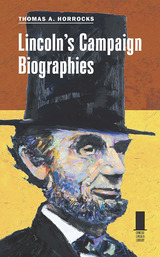
During the 1860 and 1864 presidential campaigns, Abraham Lincoln was the subject of over twenty campaign biographies. In this innovative study, Thomas A. Horrocks examines the role that these publications played in shaping an image of Lincoln that would resonate with voters and explores the vision of Lincoln that the biographies crafted, the changes in this vision over the course of four years, and the impact of these works on the outcome of the elections.
Horrocks investigates Lincoln’s campaign biographies within the context of the critical relationship between print and politics in nineteenth-century America and compares the works about Lincoln with other presidential campaign biographies of the era. Horrocks shows that more than most politicians of his day, Lincoln deeply appreciated and understood the influence and the power of the printed word.
The 1860 campaign biographies introduced to America “Honest Abe, the Rail Splitter,” a trustworthy, rugged candidate who appealed to rural Americans. When Lincoln ran for reelection in 1864, the second round of campaign biographies complemented this earlier portrait of Lincoln with a new, paternal figure, “Father Abraham,” more appropriate for Americans enduring a bloody civil war. Closing with a consideration of the influence of these publications on Lincoln’s election and reelection, Lincoln’s Campaign Biographies provides a new perspective for those seeking a better understanding of the sixteenth president and two of the most critical elections in American history.
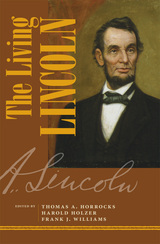
In an opening section focusing largely on Lincoln's formative years, insightful explorations into his early self-education and the era before his presidency come from editors Frank J. Williams and Harold Holzer, respectively. Readers will also glimpse a Lincoln rarely discerned in books: calculating politician, revealed in Matthew Pinsker's illuminating essay, and shrewd military strategist, as demonstrated by Craig L. Symonds. Stimulating discussions from Edna Greene Medford, John Stauffer, and Michael Vorenberg tell of Lincoln's friendship with Frederick Douglass, his gradualism on abolition, and his evolving thoughts on race and the Constitution to round out part two. Part three features reflections on his martyrdom and memory, including a counterfactual history from Gerald J. Prokopowicz that imagines a hypothetical second term for the president, emphasizing the differences between Lincoln and his successor, Andrew Johnson. Barry Schwartz's contribution presents original research that yields fresh insight into Lincoln's evolving legacy in the South, while Richard Wightman Fox dissects Lincoln's 1865 visit to Richmond, and Orville Vernon Burton surveys and analyzes recent Lincoln scholarship.
This thought-provoking new anthology, introduced at a major bicentennial symposium at Harvard University, offers a wide range of ideas and interpretations by some of the best-known and most widely respected historians of our time. The Living Lincoln is essential reading for those seeking a better understanding of this nation's greatest president and how his actions resonate today.
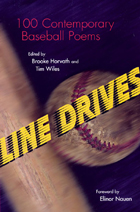
“We wait for baseball all winter long,” Bill Littlefield wrote in Boston Magazine a decade ago, “or rather, we remember it and anticipate it at the same time. We re-create what we have known and we imagine what we are going to do next. Maybe that’s what poets do, too.”
Poetry and baseball are occasions for well-put passion and expressive pondering, and just as passionate attention transforms the prose of everyday life into poetry, it also transforms this game we write about, play, or watch. Editors Brooke Horvath and Tim Wiles unite their own passion for baseball and poetry in this collection, Line Drives: 100 Contemporary Baseball Poems, providing a forum for ninety-two poets. Line after line, like baseball itself game after game and season after season, these poems manage to make the old and the familiar new and surprising.
The poems in these pages invite interrogation, and the reader—like the true baseball fan—must be willing to play the game, for these poems are fun, fresh, angry, nostalgic, meditative, and meant to be read aloud. They are keen on taking us deeply into baseball as sport and intent on offering countless metaphors for exploring history, religion, love, family, and self-identity. Each poem delivers images of pure beauty as the poets speak of murder and ghost runners and old ball gloves, of baseball as a tie that binds families—and indeed the nation—together, of the game as a stage upon which no-nonsense grit and skill are routinely displayed, and of the delight experienced in being one amid a mindlessly happy crowd. This book is true to the game’s long season and to the lives of those the game engages.
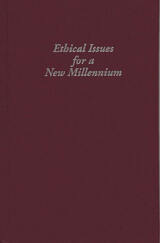
Modern advances in science and medicine bring with them an array of complex ethical dilemmas. In Ethical Issues for a New Millennium editor John Howie addresses contemporary ethical problems with eight essays from top thinkers in the field. This collection offers new and comprehensive overviews of some very tough ethical issues that will remain foremost in our minds in the years ahead. Each essay is written by a recognized authority within his or her specific field, and brings to light ethical questions rooted in ongoing philosophical debates in arenas such as human rights, the welfare state, women’s rights, genetic and gender equality, genetic equity, cloning, organ transplants, environmental ethics, insurrectionist ethics, and the erosion of moral sensibility.
These lectures where originally presented at Southern Illinois University as part of the Wayne Leys Memorial Lectures series. This collection represents the fourth volume in the series.

The second volume in applied ethics based on the distinguished Wayne Leys Memorial Lectureship Series.
With guidelines from legal reasoning, Michael D. Bayles examines “Moral Theory and Application.” Abraham Edel questions “Ethics Applied Or Conduct Enlightened?” The late Warner A. Wick shows in “The Good Person and the Good Society: Some Ideals Foolish and Otherwise” that devotion to ideals need not be either fanaticism or foolishness. John Lachs contends that many public gains are purchased at the cost of individuals being manipulated in “Public Benefit, Private Costs.” James E. Childress in “Gift of Life…” considers ethical issues in obtaining and distributing human organs. Carl Wellman in “Terrorism and Moral Rights” argues that there can be no “rights-based justification” for anti-abortion terrorism.

Abortion, euthanasia, racism, sexism, paternalism, the rights of children, the population explosion, and the dynamics of economic growth are examined in the light of ethical principles by leading philosophers in order to suggest reasonable judgments.
Originally prepared for the distinguished Wayne Leys Memorial Lecture Series at Southern Illinois University, Carbondale, the essayists have addressed themselves to the most pressing ethical questions being asked today. William K. Frankena, Professor Emeritus, University of Michigan, in “The Ethics of Respect for Life” argues for a qualified view of moral respect for human personality. From his viewpoint it is always prima facie wrong to shorten or prevent human life, but not always actually wrong as other moral conditions may counter the presumed wrong. The late William T. Blackstone in “Zero Population Growth and Zero Economic Growth” contends that justice will require the production of the maximal level of goods to fulfill basic human needs compatible with the avoidance of ecological catastrophe.
Richard Wasserstrom, Professor of Philosophy at the University of California, Santa Cruz, proposes an assimilationist ideal in “Racism, Sexism, and Preferential Treatment.” Gerald Dworkin, Professor of Philosophy at the University of Illinois, Chicago Circle, dares to ask “Is More Choice Better than Less?” Joel Feinberg, Professor of Philosophy at the University of Arizona, in “The Child’s Right to an Open Future,” offers a defense of “rights-in-trust” of children. Tom L. Beauchamp, Professor of Philosophy and Senior Research Scholar at the Kennedy Institute-Center for Bioethics of Georgetown University, considers the paternalism used to justify social policies in the practice of medicine and insists that it invariably involves a conflict between the ethical principles of beneficence and autonomy.
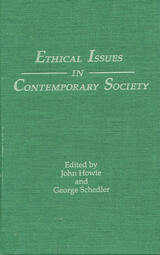
In this volume of Leys Lectures, the third collection of Wayne Leys Memorial Lectures, six distinguished essayists demonstrate the relevance of ethics to contemporary concerns by constructively exploring major ethical issues deeply embedded in our society.
The essays, written by noted scholars Tom Regan, Carol C. Gould, James Rachels, James P. Sterba, Louis P. Pojman, and David L. Norton, focus on issues of feminism, the exploitation of animals, economic injustice, racial prejudice, naive moral relativism, and the failure of public education.
Tom Regan and Louis P. Pojman both address the issue of animal rights. Regan directs his attention to an ethic-of-care feminism, which contends that the ideology of male superiority—not only to women but to all creatures—must be destroyed. By means of a "consistency argument," he extends ethic-of-care feminism to the treatment of animals, insisting that we must not permit to be done to animals "in the name of science" what we would not allow to be done to human beings. Pojman, on the other hand, addresses the question of animal rights through a critical analysis of seven theories of the moral status of animals, arguing that while animals have no natural "rights" since they are unable to enter into contracts, they do deserve to be treated kindly. In his view, much animal research could be abandoned without significant loss.
What rethinking of democracy in terms of freedom and equality is required by economic justice? Carol C. Gould offers an answer to this question by arguing that economic justice requires that workers control the production process as well as the distribution process. Such justice would provide the basis of "positive freedom" as self-development without ignoring the importance of the absence of constraints.
Taking racial prejudice as his paradigm, James Rachels explores the deeper meaning of prejudice and what equality of treatment involves. Noting the subtlety of prejudicial reasoning, he examines how stereotypes, unconscious bias, and the human tendency toward rationalization make it difficult even for people of good will to prevent prejudice from influencing their actions.
James P. Sterba invites the reader to consider a different and more general problem of how to persuade people to act for moral reasons. To accomplish this aim he shows morality to be a requirement of rationality and "the welfare liberal ideal" (the right to welfare and the right to equal opportunity) to be a fusion of the practical ends of five ideals—liberty, fairness, common good, androgyny, and equality.
For David L. Norton, one of our most pressing problems is the failure of our educational system. The system fails to enable students to make wise "life-shaping" choices involving vocation, marriage, children, and friendship. In order to make good choices, human beings must live and work in an environment that provides experiences that authenticate "personal truths" indispensable to worthy living. These personal truths include direct acquaintance with vocational alternatives and participation in actual service to others.
Collectively, these essays bring into sharp focus the urgent moral issues confronting our society and the need for ongoing discussion and examination of these issues in order to gain deeper understanding of and possible solutions to the problems they present.
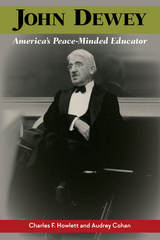
In John Dewey, America’s Peace-Minded Educator, authors Charles F. Howlett and Audrey Cohan take a close look at John Dewey’s many undertakings on behalf of world peace. This volume covers Dewey’s support of, and subsequent disillusionment with, the First World War as well as his postwar involvement in trying to prevent another world war. Other topics include his interest in peace movements in education, his condemnation of American military intervention in Latin America and of armaments and munitions makers during the Great Depression, his defense of civil liberties during World War II, and his cautions at the start of the atomic age. The concluding epilogue discusses how Dewey fell out of favor with some academics and social critics in the 1950s and explores how Dewey’s ideas can still be useful to peace education today.
Exploring Dewey’s use of pragmatic philosophy to build a consensus for world peace, Howlett and Cohan illuminate a previously neglected aspect of his contributions to American political and social thought and remind us of the importance of creating a culture of peace through educational awareness.
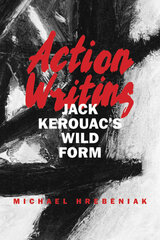
Action Writing: Jack Kerouac's Wild Form connects the personal and creative development of the Beat generation's famous icon with cultural changes in postwar America. Michael Hrebeniak asserts that Jack Kerouac's "wild form"—self-organizing narratives free of literary, grammatical, and syntactical conventions—moves within an experimental continuum across the arts to generate a Dionysian sense of writing as raw process. Action Writing highlights how Kerouac made concrete his 1952 intimation of "something beyond the novel" by assembling ideas from Beat America, modernist poetics, action painting, bebop, and subterranean oral traditions.
Geared to scholars and students of American literature, Beat studies, and creative writing, Action Writing places Kerouac's writing within the context of the American art scene at midcentury. Reframing the work of Kerouac and the Beat generation within the experimental modernist and postmodernist literary tradition, this probing inquiry offers a direct engagement with the social and cultural history at the foreground of Kerouac's career from the 1940s to the late 1960s.
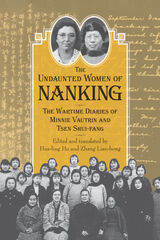
One of the Chinese American Librarians Association’s Ten Best Books of 2010
During the infamous “Rape of Nanking,” a brutal military occupation of Nanking, China, that began on December 13, 1937, it is estimated that Japanese soldiers killed between 200,000 and 300,000 Chinese and raped between 20,000 and 80,000 women. To shelter civilian refugees, a group of Westerners established a Nanking Safety Zone. Among these humanitarians was Minnie Vautrin, an American missionary and acting president of Ginling College. She and Tsen Shui-fang, her Chinese assistant and a trained nurse, turned the college into a refugee camp, which protected more than 10,000 women and children during the height of the ordeal. The Undaunted Women of Nanking juxtaposes day-by-day the exhausted and terrified women’s wartime diaries, providing vital eyewitness accounts of the Rape of Nanking and a unique focus on the Ginling refugee camp and the sufferings of women and children. Vautrin's diary reveals the humanity and courage of a female missionary in a time of terror. Tsen Shui-fang’s diary, never before published in English and translated here for the first time, is the only known daily account by a Chinese national written during the crisis and not retrospectively. As such, it records a unique perspective: that of a woman grappling with feelings of anger, sorrow, and compassion as she witnesses the atrocities being committed in her war-torn country.
Editors Hua-ling Hu and Zhang Lian-hong have added many informative annotations to the diary entries from sources including the proceedings of the Tokyo War Crimes Trial of 1946, Vautrin’s correspondence, John Rabe’s diary, and other historical documents. Also included are biographical sketches of the two women, a note on the diaries, and information about the aftermath of the tragedy, as well as maps and photos—some of which appear in print in this book for the first time.
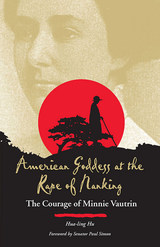
The Japanese army’s brutal four-month occupation of the city of Nanking during the 1937 Sino-Japanese War is known, for good reason, as “the rape of Nanking.” As they slaughtered an estimated three hundred thousand people, the invading soldiers raped more than twenty thousand women—some estimates run as high as eighty thousand. Hua-ling Hu presents here the amazing untold story of the American missionary Minnie Vautrin, whose unswerving defiance of the Japanese protected ten thousand Chinese women and children and made her a legend among the Chinese people she served.
Vautrin, who came to be known in China as the “Living Goddess” or the “Goddess of Mercy,” joined the Foreign Christian Missionary Society and went to China during the Chinese Nationalist Revolution in 1912. As dean of studies at Ginling College in Nanking, she devoted her life to promoting Chinese women’s education and to helping the poor.
At the outbreak of the war in July 1937, Vautrin defied the American embassy’s order to evacuate the city. After the fall of Nanking in December, Japanese soldiers went on a rampage of killing, burning, looting, rape, and torture, rapidly reducing the city to a hell on earth. On the fourth day of the occupation, Minnie Vautrin wrote in her diary: “There probably is no crime that has not been committed in this city today. . . . Oh, God, control the cruel beastliness of the soldiers in Nanking.”
When the Japanese soldiers ordered Vautrin to leave the campus, she replied: “This is my home. I cannot leave.” Facing down the blood-stained bayonets constantly waved in her face, Vautrin shielded the desperate Chinese who sought asylum behind the gates of the college. Vautrin exhausted herself defying the Japanese army and caring for the refugees after the siege ended in March 1938. She even helped the women locate husbands and sons who had been taken away by the Japanese soldiers. She taught destitute widows the skills required to make a meager living and provided the best education her limited sources would allow to the children in desecrated Nanking.
Finally suffering a nervous breakdown in 1940, Vautrin returned to the United States for medical treatment. One year later, she ended her own life. She considered herself a failure.
Hu bases her biography on Vautrin’s correspondence between 1919 and 1941 and on her diary, maintained during the entire siege, as well as on Chinese, Japanese, and American eyewitness accounts, government documents, and interviews with Vautrin’s family.
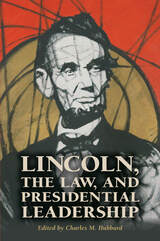
The volume’s contributors not only address specific situations and issues that assisted in Lincoln’s development of a new understanding of law and its application but also show Lincoln’s remarkable presidential leadership. Among the topics covered are civil liberties during wartime; presidential pardons; the law and Lincoln’s decision-making process; Lincoln’s political ideology and its influence on his approach to citizenship; Lincoln’s defense of the Constitution, the Union, and popular government; constitutional restraints on Lincoln as he dealt with slavery and emancipation; the Lieber codes, which set forth how the military should deal with civilians and with prisoners of war; the loyalty (or treason) of government employees, including Lincoln’s domestic staff; and how Lincoln’s image has been used in presidential rhetoric. Although varied in their strategies and methodologies, these essays expand the understanding of Lincoln’s vision for a united nation grounded in the Constitution.
Lincoln, the Law, and Presidential Leadership shows how the sixteenth president’s handling of complicated legal issues during the Civil War, which often put him at odds with the Supreme Court and Congress, brought the nation through the war intact and led to a transformation of the executive branch and American society.
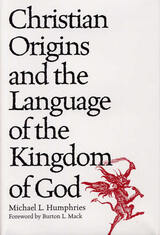
Traditionally, scholars have traced the origin of Christianity to a single source—the kingdom of God as represented in the message of the historical Jesus. Through a rhetorical critical analysis of one of the most important texts in early Christian literature (the Beelzebul controversy), Michael L. Humphries addresses the issue of Christian origins, demonstrating how the language of the kingdom of God is best understood according to its locative or taxonomic effect where the demarcation of social and cultural boundaries contributes to the emergence of this new social foundation.
The Beelzebul controversy exists in two versions— Q and Mark—and thereby allows the study to engage the import of the kingdom language at the point of juxtaposition between two distinct textual representations. This makes it possible to deal directly with the issue of the disparity of texts in the synoptic tradition. Humphries suggests that these two versions of the same controversy indicate two distinct social trajectories wherein the kingdom of God comes to mean something quite different in each case but that nevertheless they demonstrate a similarity in theoretical effect where the language contributes to the emergence of relatively distinct social formations.
Humphries establishes the Q and Markan versions of the Beelzebul controversy as relatively sophisticated compositions that are formally identified as elaborate chreiai (a literary form used in the teaching of rhetoric at the secondary and post-secondary level of GrecoRoman education) and that offer an excellent example of the rhetorical manipulation of language in the development of social and cultural identity.

Volume 6 of the Leadership Symposia—sponsored by the Department of Administrative Sciences and College of Business Administration at Southern Illinois University, Carbondale—charts the state of the field of leadership through a judicious mixture of established and emerging scholars.
The text is broken into four parts, with each part containing an Introduction by the editors. Part 1 consists of “Leadership and Managerial Behavior as Loosely Coupled Systems for Moving Beyond Establishment Views,” by the editors; “The Relevance of Some Studies of Managerial Work and Behavior to Leadership Research,” Rosemary Stewart; “Unstructured, Nonparticipant Observation and the Study of Leaders’ Interpersonal Contacts,” Robert S. Bussom, Lars L. Larson, and William M. Vicars; “Leaders on Line,” Michael M. Lombardo and Morgan W. McCall, Jr.; and “Various Paths Beyond Establishment Views,” Bernard Wilpert.
Part 2 contains “Multiplexed Supervision and Leadership,” Fred Dansereau, Jr., Joseph A. Alutto, Steven E. Markham, and MacDonald Dumas; “A Theory of Leadership Categorization,” Robert G. Lord, Roseanne J. Foti, and James S. Phillips; “Leadership Activation Theory,” John E. Sheridan, Jeffrey L. Kerr, and Michael A. Abelson; and “Intensity of Relation, Dyadic-Group Considerations, Cognitive Categorization, and Transformational Leadership,” Bernard M. Bass; “Strategies for Dealing with Different Processes in Different Contexts,” Ian Morley, “A Multiplexed Response to Bass and Morley,” Fred Dansereau, Jr., Joseph A. Alutto, Steven E. Markham, and MacDonald Dumas; and “Properly Categorizing the Commentary,” Roseanne J. Foti, Robert G. Lord, and James S. Phillips.
Part 3 contains “SYMLOG and Leadership Theory,” Robert F. Bales and Daniel J. Isenberg; “Toward a Macro-Oriented Model of Leadership: An Odyssey,” James G. Hunt and Richard N. Osborn; and “Toward a Paradigm Shift in the Study of Leadership,” Henry J. Tosi, Jr.
Essays in part 4 are “If You’re Not Serving Bill and Barbara, Then You’re Not Serving Leadership,” Henry Mintzberg; “Beyond Establishment Leadership Views: An Epilog,” by the editors; “Leadership Research and the European Connection: An Epilog,” Dian-Marie Hosking and James G. Hunt; and “Conclusion: The Leadership-Management Controversy Revisited,” Schriesheim, Hunt, and Sekaran.
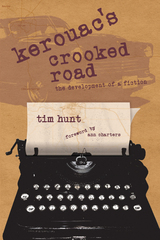
Now a classic, Kerouac’s Crooked Road was one of the first critical works on the legendary Beat writer to analyze his work as serious literary art, placing it in the broader American literary tradition with canonical writers like Herman Melville and Mark Twain. Author Tim Hunt explores Kerouac’s creative process and puts his work in conversation with classic American literature and with critical theory.
This edition includes a new preface by the author, which takes a discerning look at the implications of the 2007 publication of the original typewriter scroll version of On the Road for the understanding of Kerouac and his novel. Although some critics see the scroll version of the novel as embodying Kerouac’s true artistic vision and the 1957 Viking edition as a commercialized compromise of that vision, Hunt argues that the two versions should not be viewed as antithetical but rather as discrete perspectives of a writer deeply immersed in writing as both performance and evolving process.
Hunt moves beyond the mythos surrounding the “spontaneous creation” of On the Road, which upholds Kerouac’s reputation as a cultural icon, to look more closely at an innovative writer who wanted to bridge the gap between the luscious, talk-filled world of real life and the sterilized version of that world circumscribed by overly intellectualized, literary texts, through the use of written language driven by effusive passion rather than sober reflection. With close, erudite readings of Kerouac’s major and minor works, from On the Road to Visions of Cody,Hunt draws on Kerouac’s letters, novels, poetry, and experimental drafts to position Kerouac in both historical and literary contexts, emphasizing the influence of writers such as Emerson, Melville, Wolfe, and Hemingway on his provocative work.
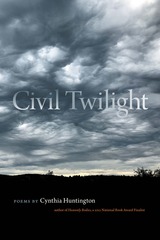
New collection from National Book Award finalist
Civil twilight is the astronomical term for the minutes just before sunrise and just after sunset. If one took a snapshot, it would be impossible to tell whether the light was increasing or diminishing. The poems in Civil Twilight arise in this liminal space. With luminous precision, Cynthia Huntington examines the civil twilight we live in now, unsure of whether the darkness is closing in or whether the light is about to break.
Here the poet is both skeptic and seeker, for any hope worth discovering needs to withstand the facts at hand. Is everything getting worse, or are things about to improve? Or is this the way things have always been, both hopeful and terrifying, and it is our questions that need to change? In part one, the speaker strives for balance by maintaining light and warmth in a cold season. In part two, American scenes of construction and destruction are set beside moments from history: Rome, the British Empire, and American immigration. Part three enfolds questions of history and power within winter scenes and the artist’s imagination. In part four, the speaker looks back and admits answers remain elusive, yet points to the new ways of thinking and feeling about survival that have resulted from the work. And here, the half-light shifts. In a world teetering on the edge of collapse, Civil Twilight wrestles hard-won hope from disquiet, coming to rest in what is.
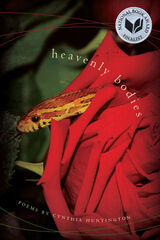
In this blistering collection of lyric poems, Cynthia Huntington gives an intimate view of the sexual revolution and rebellion in a time before the rise of feminism. Heavenly Bodies is a testament to the duality of sex, the twin seductiveness and horror of drug addiction, and the social, political, and personal dramas of America in the 1960s.
From the sweetness of purloined blackberries to the bitter taste of pills, the ginger perfume of the Hawaiian Islands to the scream of the winter wind, Huntington’s fearless and candid poems offer a feast for the senses that is at once mystical and earthy, cynical and surreal. Echoing throughout are some of the most famous—and infamous—voices of the times: Joan Baez and Charles Manson, Frank Zappa and Betty Friedan. Jinns and aliens beckon while cities burn and revolutionaries thunder for change. At the center is the semiautobiographical Suzy Creamcheese, sensual and rebellious, both almighty and powerless in her sexuality.
Achingly tender yet brutally honest, Heavenly Bodies is an unflinching reflection on the most personal of physical and emotional journeys.
Univeristy Press Books for Public and Secondary Schools 2013 edition
Finalist for the National Book Award in Poetry, 2012
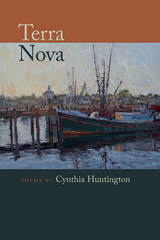
In this bold and ambitious book-length poem, National Book Award finalist Cynthia Huntington explores exile and migration—what it means to lose, seek, and find home in all its iterations—through a polyphonic work, written in multiple voices and evoking the method of Hart Crane’s The Bridge or the Nighttown episode in James Joyce’s Ulysses. Yet it is also a tough and vernacular work, owing as much to Patti Smith and the Clash as it does to High Modernism.
Again and again the work shows us outsiders forced into metaphorical and literal wildernesses, whether in a retelling of the biblical Israelites lost in the desert or in stories from Provincetown, Massachusetts, where the new world struggles into being at the edge of the sea. Yet the voices here, across many times and places, refuse to give in to desolation and despair.
Huntington’s approach is hybrid, oscillating between verse and lyrical prose to create a work that falls somewhere between an epic poem and a collection of lyric essays. Whether chronicling the creation of the world and the first exile from the Judeo-Christian Garden of Eden or imagining the terror and thrill of the first sea voyages, this is electric poetry: challenging, startling, and fulfilling.
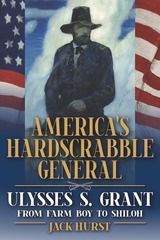
Renowned for his skill, courage, and indomitability during the Civil War, Ulysses S. Grant is considered a model for outstanding American generalship. However, unlike most of his fellow officers, Grant came from humble Midwestern beginnings and experienced a number of professional failures before rising to military prominence.
Grant grew up on a farm on the Ohio frontier and reluctantly attended West Point, where he finished in the middle of his class. In his early army career, he was often underestimated by his peers despite valiant service. After the Mexican War Grant’s “Hardscrabble” farm outside St. Louis failed, and when he decided to rejoin the U.S. army, he was given the unenviable command of a rowdy volunteer regiment, the 21st Illinois.
How did Grant—an average student, failed farmer, and common man—turn the 21st Illinois into a showcase regiment and become a successful general? In this engaging analysis, Jack Hurst argues that Grant’s military brilliance stemmed not from his West Point education but rather from his roots in America’s lower middle class and its commonsense values. His upbringing in the antebellum rural Midwest undergirded his military skill and helped him develop an innate humility, sense of justice, and ability to focus, leading him to form close relationships with his men.
Through a detailed account of Grant’s early years, from boyhood through the Battle of Shiloh, Hurst explores how Grant’s modest start and experiences in the Mexican War prefigured his greatest military triumphs. Ultimately Grant abandoned the traditional military practice of his time, which relied upon maneuver, and instead focused on fighting. His strategy to always move forward, win or lose, turned even his losses into essential elements of victory and characterized the aggressive, relentless approach that would ultimately win the Civil War and save the Union.

This is the first comprehensive play-by-play analysis of the drama of David Storey, one of the most acclaimed and innovative, sometimes controversial, writers in the British theatre since World War II. Grouping the plays according to theme, Hutchings demonstrates that the central focus in the drama of David Storey is the devaluation of traditional rituals in contemporary life and the disintegration of the family. A playwright attuned to the poetry in the ordinary, to the profundity, subtle eloquence, and dramatic tension in the mundane, Storey explores the ways people cope, or fail to cope, with complexity, with uncertainty, with constant, bewildering flux. He writes about groups—families (In Celebration, The Farm), rugby teams (The Changing Room), and construction crews (The Contractor). In his plays, individuals seek to overcome isolation and integrate themselves into a significant assemblage that transcends the self.
Hutchings notes that Storey frequently deals with working-class parents who cannot "understand their grown children’s anxieties, their discontentedness with life, their unstable marriages, and their inability to enjoy the benefits of the education and advantages they labored so hard for so many years to provide."
Storey understands and sympathizes with parents who have paid to educate their children out of their own spheres. He saw it happen in his own family, knew the disapproval of his father: "What else could my father think when, nearing sixty, he came home each day from the pit exhausted, shattered by fatigue, to find me—a young man ideally physically equipped to do the job which now left him totally prostrated—painting a picture of flowers, or writing a poem about a cloud. There was, and there is, no hope of reconciliation."
Hutchings supplements his thematic analysis of Storey’s plays by interweaving into his text 90 percent of a major interview with the playwright, the only such comprehensive interview in existence. Storey, who believes that readers "ought to be chary of all interviews," discusses alleged literary influences on his work, the current state of British theatre, and his reactions to critics. He also provides insight into various productions and performances in his work.
READERS
Browse our collection.
PUBLISHERS
See BiblioVault's publisher services.
STUDENT SERVICES
Files for college accessibility offices.
UChicago Accessibility Resources
home | accessibility | search | about | contact us
BiblioVault ® 2001 - 2024
The University of Chicago Press









